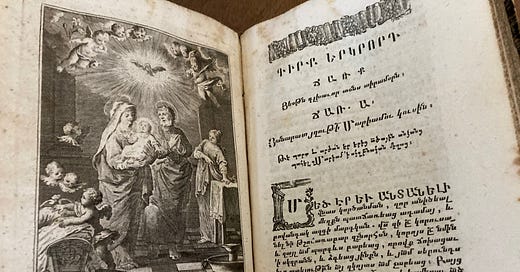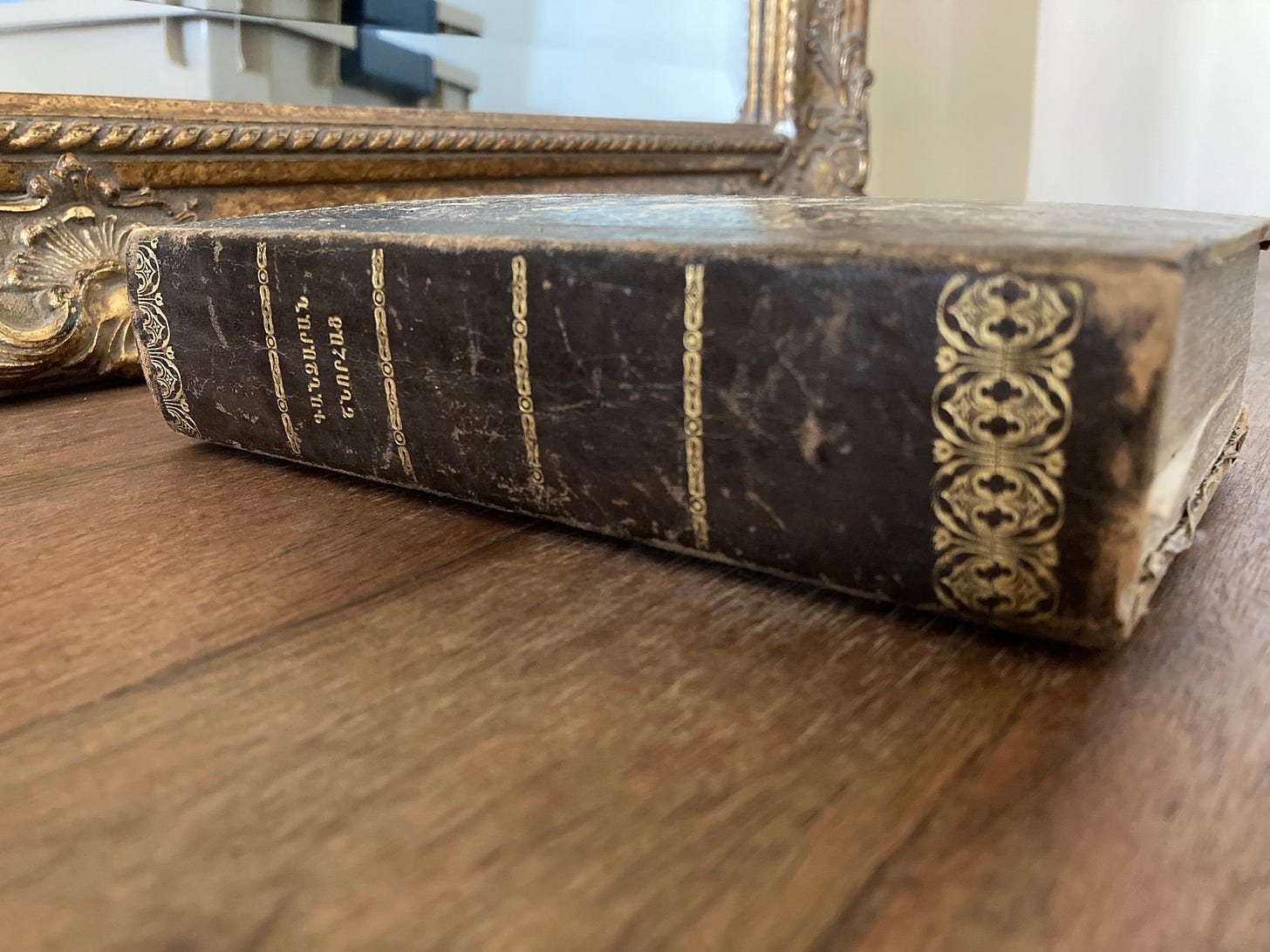While in the process of moving, I rediscovered my great grandmother’s Armenian Bible…rather providential in light of the last two weeks’ events. Though my great grandmother survived the genocide, she, my great grandfather, and my grandfather had to escape Istanbul in the 1950s because the Turkish government paid civilians to ransack Greek and Armenian homes and businesses.
You are likely to have heard little about what happened and is still happening in Armenia. The story does not fit neatly into pop social justice narratives du jour. Nor is it politically or economically expedient for the US and allied nations to express their concern. My own grandfather has a hard time talking about the history, and even telling people that his mother was Armenian…the trauma surrounding those memories makes it extremely painful to share.
Cracks in PoMo normally doesn’t post “sincere,” unironic political content, but some things are grave enough to call for a break of character. Call Lasch on us if you must… So our readers can learn more about the crisis, we asked Simone Rizkallah to write this piece.
The Nagorno Karabakh (known as Artsakh to Armenians) is an ethnically Armenian and therefore religiously Christian region in the South Caucasus. It’s a territory not officially part of the Republic of Armenia, but Armenians have been living there since the 7th century BC. This is the place where the Armenian alphabet was developed, and is home to monastic architectural masterpieces from the 4th century.
On September 19th, 2023, Azerbaijan, a majority Muslim country, launched a full assault against the 120,000 civilian Christians, including 30,000 children in the disputed territory. (Why the territory is disputed is another story.) This attack came after 281 days of blockading the region from the Lachin Corridor, the only route connecting it to Armenia proper, and thereby cutting off food, gas, medical supplies effectively starving the residents.
While this blockade is new, their desire to religiously and ethnically cleanse the region is not. Nor is their desire to create one seamless pan-Turkic region:
Our goal is the complete elimination of Armenians. You, Nazis, already eliminated the Jews in the 1930s and 1940s, right? You should be able to understand us” – Hajibala Abutalybov, former mayor of Azerbaijan's capital city, Baku, to a German audience in 2005.
This is the moment (when the world is distracted with Russia and Ukraine, among other reasons) where the Azeris and Turks (“One nation, two states.”) can finally rid the population through advanced weaponry for whoever hasn’t starved to death yet or taken a one-way ticket out of the region.
The fact that Armenia and Armenians are in existence today is nothing short of a miracle. My own family left the modern-day Turkish region, Diyarbakir (ancient Armenia “Dikranagerd”) for Egypt to escape the Genocide of 1.5 million Armenians at the hands of the Ottomans during the First World War. Their descendants today (the Turks and Azeris, who are ethnically Turkish) are simply continuing the mission. In 2020, Turkey and Azerbaijan together attacked the region and the president of Turkey boasted, saying that this is the fulfillment of “the mission of our grandfathers” in the Caucuses. Their goal in 2020 is finally being fulfilled in 2023.
Throughout history, Armenians have consistently faced aggressors with this genocidal mentality. For this reason, there are more Armenians in the diaspora than in the Republic of Armenia, the size of which is significantly smaller than what Armenia used to be. Interestingly, the word genocide was first coined by Polish jurist Raphael Lemkin from his studies on what happened to the Armenians in the last century. When Hitler was defending and planning his own genocide of the Jews, he remarked, “for who remembers the annihilation of the Armenians?” The same is true today.
If the United States wanted to save Armenians from this second genocide, she could. But Ilham Aliyev, the President of Azerbaijan, knows that he can get away with genocide because the Biden Administation has yet to sanction Azerbaijan. Armenia provides no economic benefit to the world and therefore she remains politically friendless. However, this tiny Christian nation, surrounded by Turkey, Azerbaijan and Iran to the South, is a testament to Western faith, culture, and values such as the right to freedom, self-determination and democracy and is therefore worth defending.
It is surreal for me to watch these people continue to lose their lives, starve to death, be driven from their homes and livelihoods and land they have occupied for thousands of years. As of January 1, 2024 the Republic of Artsakh will cease to exist. The Republic of Armenia is next of course—Aliyev is already referring to the region as “Western Azerbaijan.”
There isn’t an Armenian alive today who doesn’t have an Armenian Genocide story, a loss from the 2020 war, or is currently suffering today by what’s happening right now.
In the last century, Americans, in the words of historian Howard Sacher, “quite literally kept an entire nation alive.” That nation was Armenia. The story is well documented in a book by Peter Balakian entitled, The Burning Tigris: The Armenian Genocide and America’s Response. My prayer, “hoping against hope,” is that history would repeat itself and the United States would once again keep our nation alive. Now is the time to act. Perhaps the world isn’t watching, but the people of Artsakh and Armenia certainly are.
The world’s first Christian nation (301 AD) and the ancient place where Noah’s Ark finally parked on dry land (Mt. Ararat) needs your intercession. Share what’s going on right now with your neighbors and friends, post on social media and help spread awareness, contact your 2024 candidates and U.S. Representatives, go see the new film about Soviet Armenia, “Amerikatsi” (“the American” in Armenian) and if you are a person of prayer, then please, do pray.
If you’d like to stay informed about what’s happening in the region and how you can help, please visit The Philos Project at www.philosproject.org/savearmenia and sign up for the newsletter.
Simone Rizkallah works at Endow, an apostolate for women dedicated to cultivating a New Feminism according to the vision of Pope St. John Paul II. As a first generation American of Egyptian-Armenian descent, Simone has a particular interest in matters of religious freedom, culture and the Eastern roots of the Faith. She is Special Advisor to the President of the Philos Project, a frequent guest on Catholic Answers Live, and a faculty member of the Avila Institute. You can find her talks and publications on culturalgypsy.com and her thoughts on the prophetic value of church documents on The Endow Podcast.
For more on Armenia, check out James Baldwin, Blindness, and Hagia Sophia.
Please consider signing up for a paid subscription to this page for more riveting content. If you’re new to Cracks in Pomo, check out the About page or read up on our Essentials. Also check out our podcast on Spotify, Apple, and YouTube and follow us on Instagram and Twitter.





Glad to see someone take the time to write an article on the plight of Armenians and Azerbaijan’s pogroms